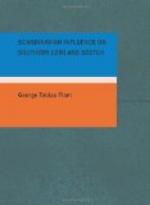WANDRETH, sb. sorrow, trouble. Douglas,
I, 88, 14. O.N.
vandraeethi, difficulty,
trouble. Norse, vanraad, misery,
poverty.
WANT, VANT, vb. lack, stand in need of, suffer.
Montg., S., 48, 3;
Lyndsay, 152, 40704; Bruce,
V, 422; Burns, 113, 2, 3. O.N.
vanta, to lack.
Norse vanta, lack, never means desire.
This is the regular use of
the word in Sco.
WANTHREIVIN, adj. unthriven, miserable.
Montg., F., 327. O.N.
van + þrifenn,
Norse vantreven, O.N. vb. þrifa, Norse
triva, vantriva
(refl.). See Skeat under Eng. thrive and
thrift.
WAP (w[)ae]p), vb. to turn, overturn, throw,
hurl. Douglas, I, 2,
20; III, 167, 28; Gol. and
Gaw., 127. O.N. vappa, to waddle.
Norse vappa, turn,
wrap around. Sw. dial. vappla, wrap up.
Cu. wap, to wrap.
WARE, vb. to lay out money, spend. Rolland,
III, 450; Dunbar, 92,
13; R.R., 3553. O.N.
verja, to invest money. See Wall.
WAUR, vb. to overcome. Burns, 7, 1, 7;
Psalms, CXL, 2. See werr.
Cp. Eng. worst
as a vb. and superlative of bad, worse.
WEIK, vb. to weaken. Scott, 68, 14.
Cp. Norse veikja, to
weaken, make weak. O.N.
vaeikja, to grow weak, both from adj.
vaeikr, weak, same
as O.E. w[-a]c. The Sco. vb. may be
formed directly from the adj.,
in which case its origin
becomes uncertain. Skeat
says Eng. weak, M.E. weyke (which
replaced wook < O.E.
w[-a]c), is from O.N. vaeikr. But
the M. Sco. form of O.E. or
O. Nhb. w[-a]c was w[-a]ke
(w[-e]k); our word could come
from this. The diphthong,
however, rather indicates
that it comes from the Norse vb.
WEILL-VARANDLY, adv. in a proper manner.
R.R., 911. See farrand.
Cp. O.N. fara vel,
Norse fara vel, to go well, velfaren,
gone well.
WELTER, vb. to roll, turn, overturn. Bruce,
XI, 25; III, 700;
Douglas, II, 125, 25; T.M.W.,
439; Lyndsay, 342, 770. O.N.
valtra, to be unsteady,
not firm, easily shaken. O. Sw.
valltra, Sw. dial.
vaelltra, to roll.
WERR, WERE, WAR, VAR, WAUR, adj. worse.
C.S., 57; Lyndsay,
428, 1392; R.R., 589, etc.
O.N. verr, worse, Norse verr,
verre, Dan. vaerre,
Sw. vaerr, Cu. waar. This is the
modern Sco. pronunciation
of it. The O. Fr. wirra does not
correspond to the Sco. forms
of the word. It is most common in
Scotland and N.W. England.




